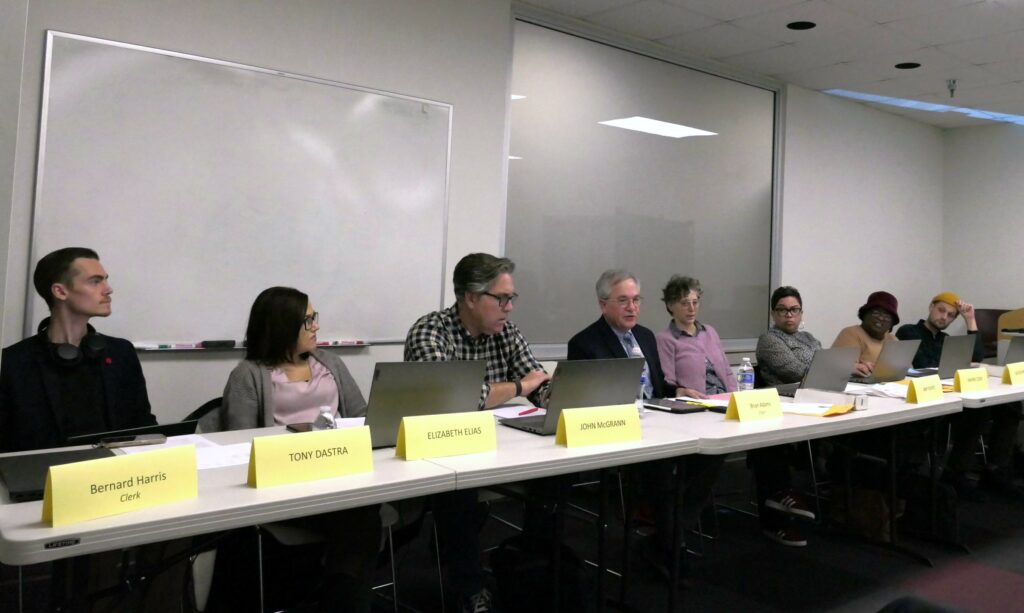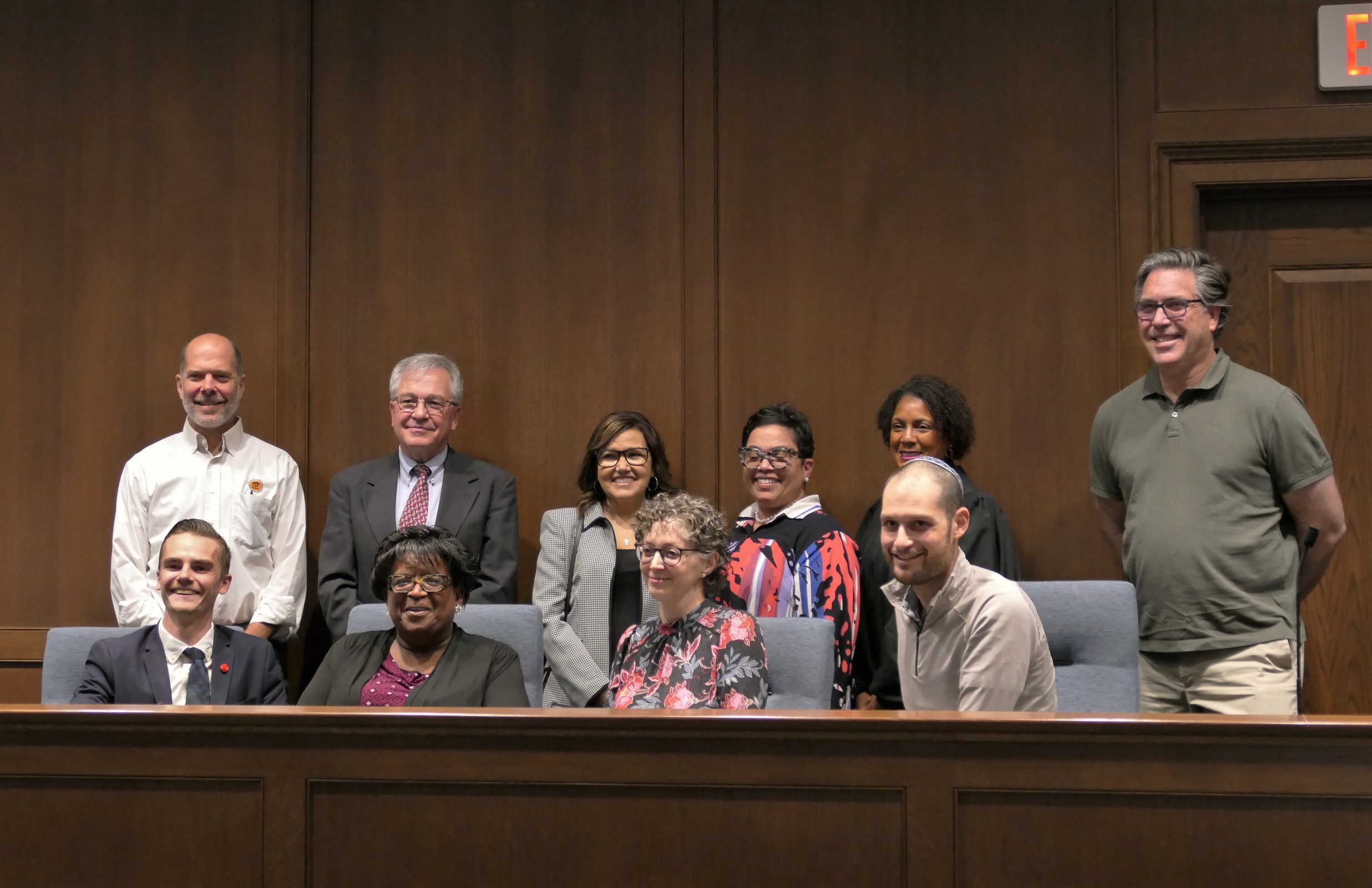The Home Rule Study Commission anticipates calling a special meeting in mid-January to deliberate and vote on the key question it has been considering since the summer: Whether to proceed with drafting a home rule charter for Lancaster.
Scheduling a special meeting will allow the commission to hold its regular December and January meetings in neighborhood venues as planned, continuing its research and analysis of city structure and operations, Chairman Brian Adams said.
- Related: A look at home rule with the Pa. Economy League, the nonprofit advising Lancaster’s study commission
The commission’s timeline is divided neatly into two halves: It has a nine month “study phase” to examine local government and options for changing it, and another nine months to write a charter if it determines that’s the best path forward.
The starting point is the date of its election, May 16, putting its nine-month midpoint in mid-February. Technically, that’s its deadline for the vote.
However, Pennsylvania Economy League consultant Gerald Cross advised the commission members to schedule it earlier. That’s because if they choose not to move ahead with a charter, they still have to prepare a “final report” with their findings and recommendations, and they need time to do that before their nine months expire.

Taxes, financial operations
The discussion of timing took place Thursday at the start of the commission’s November meeting. Sparsely attended, it was held at Thaddeus Stevens College of Technology, the second of four consecutive meetings being held at neighborhood venues, one in each city quadrant.
Much of the meeting was taken up with debate over city financial operations and the relatively modest roles of the elected treasurer and controller; and whether state legislation might ease the financial plight of small cities like Lancaster.
The latter discussion stemmed from the written responses received from state Reps. Mike Sturla and Ismail Smith-Wade-El in response to the commission’s questions.
Both lawmakers cited bills they are sponsoring or co-sponsoring that could give cities like Lancaster more revenue options: An optional county sales tax, with revenue distributed to municipalities (Sturla); or a tax on employers’ payrolls and higher earned income tax, balanced by a partial property-tax reduction (Smith-Wade-El).
The payroll tax, known formally as a “payroll preparation tax,” currently is available only to jurisdictions classified as financially distressed.
In response to commission members’ questions, Cross said a home rule charter would not allow Lancaster to implement a new tax: Only the state can declare a particular asset class or revenue stream to be taxable.
Nor should the commission or Lancaster government bank on Harrisburg to deliver a solution. New taxes are extremely contentious, for obvious reasons, and are rarely passed. When they are, the legislature usually eliminates another tax in exchange and tailors the new tax to make the net result revenue-neutral.
Better to focus on what’s within local control, he said. Paraphrasing Benjamin Franklin, he quipped: “If you live on hope, you’ll die fasting.”
Mayor Danene Sorace, who was sitting in the audience, reminded the commission that, should it draft a charter, it can include strong limits on how much the city can raise taxes. The goal of home rule, she said, isn’t to enhance the city’s power to tax people per se, but to keep city services running.
Evolving treasury role
Reacting to the written response of Treasurer Vincent Derek Smith, commission member Maxine Cook expressed surprise that he has so little interaction with City Council or the budget process. That’s due to the evolution of the treasury function, said Cross and fellow PEL consultant Fred Reddig.
The treasurer is essentially a tax collector and for a city the size of Lancaster, the job is too big for one person. Therefore, it’s handled by a Treasury Bureau, a division of the Department of Administrative Services with 17 staff members. For decades, the individual who is elected treasurer has signed over his duties via an agreement with the city, Solicitor Barry Handwerger said.
The controller’s modern role is somewhat attenuated as well. The controller continues to review and sign off on contracts and disbursements, but does so through the city’s centralized purchasing system.
The controller is part of the city’s “checks and balances,” Reddig said, the treasurer is not.
Home rule charters often eliminate one or both of those positions, Redding and Cross said. The controller is eliminated less often: Sometimes, especially at the county level, it’s redefined as an internal auditor position, Cross said.
The commission agreed to invite Smith to their next meeting. He will be the first official to be invited directly, although any are free to attend. Sorace has been at several besides Thursday’s.
Next steps
In other business, the commission decided to continue with its rounds of written questions. This time, questions will be sent to the three living former mayors: Art Morris, Janice Stork and Rick Gray.
Lastly, commissioners divvied up the task of interviewing leaders of seven municipalities suggested by PEL as offering helpful comparisons with Lancaster: Allentown, Altoona, Easton, Harrisburg, Hazleton, Reading and Williamsport.
Two commission members are to meet virtually with each city’s leadership, with an option for Chairman Adams or Vice Chairwoman Amy Ruffo to sit in. Each member will then write up his or her notes to provide to the rest of the commission.
Those arrangements avoid any potential Sunshine Law violations, Handwerger explained. Having no more than three commission participants keeps the gatherings well short of a quorum, which would make the gathering an official meeting, requiring public advertising in advance. Writing notes together could be considered the activity of a de facto committee; writing them separately is not.
Commission member Darlene Byrd asked about visiting the municipalities in person. Members are welcome to make visits on their own, but for logistical convenience and budgetary reasons, the official meetings should be done virtually, Adams said.
After further discussion, during which Byrd reminded her colleagues that they had discussed travel and a budget for it, Adams agreed to look into the issue further and revisit it next month.
The December and January meetings are planned for the northeast and northwest, respectively, Adams said. The specific locations are still being finalized.






